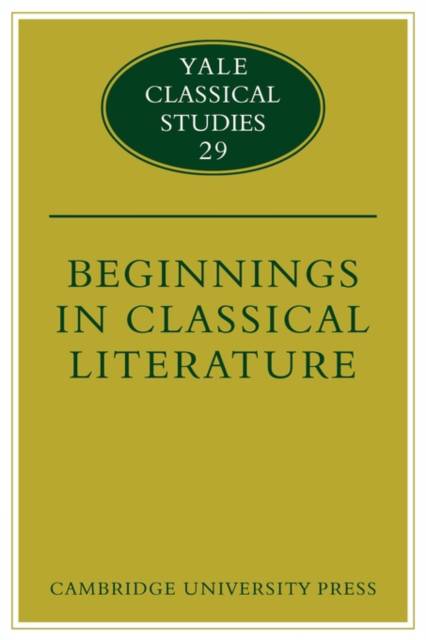
Bedankt voor het vertrouwen het afgelopen jaar! Om jou te bedanken bieden we GRATIS verzending (in België) aan op alles gedurende de hele maand januari.
- Afhalen na 1 uur in een winkel met voorraad
- In januari gratis thuislevering in België
- Ruim aanbod met 7 miljoen producten
Bedankt voor het vertrouwen het afgelopen jaar! Om jou te bedanken bieden we GRATIS verzending (in België) aan op alles gedurende de hele maand januari.
- Afhalen na 1 uur in een winkel met voorraad
- In januari gratis thuislevering in België
- Ruim aanbod met 7 miljoen producten
Zoeken
Beginnings in Classical Literature
€ 64,95
+ 129 punten
Omschrijving
The ways in which literary works begin have proved fascinating to readers and critics at least since Aristophanes. This collection of essays gives life to a topic of perennial interest by presenting a variety of original readings in nearly all the major genres of Greek and Latin literature. The subjects of these essays range from narrative voices in the opening of the Odyssey to ideological reasons for Tacitus' choice of a beginning in the Histories, and from a survey of opening devices in Greek poetry to the playwright's negotiations with the audience in Roman comedy. Other papers discuss 'false starts' in Gorgias and Herodotus, the prologues of Greek tragedy, Plato's 'frame' dialogues, delayed proems in Virgil, the role of the patron in Horace, aristocratic beginnings in Seneca, and 'inappropriate' prefaces in Plutarch. By embracing a variety of authors and a broad range of approaches, from formal analysis of opening devices to post-structural interpretation, these twelve contributions by both younger and established scholars offer an exciting new perspective on beginnings in classical literature.
Specificaties
Betrokkenen
- Uitgeverij:
Inhoud
- Aantal bladzijden:
- 256
- Taal:
- Engels
- Reeks:
- Reeksnummer:
- nr. 29
Eigenschappen
- Productcode (EAN):
- 9780521124560
- Verschijningsdatum:
- 10/12/2009
- Uitvoering:
- Paperback
- Formaat:
- Trade paperback (VS)
- Afmetingen:
- 152 mm x 229 mm
- Gewicht:
- 381 g

Alleen bij Standaard Boekhandel
+ 129 punten op je klantenkaart van Standaard Boekhandel
Beoordelingen
We publiceren alleen reviews die voldoen aan de voorwaarden voor reviews. Bekijk onze voorwaarden voor reviews.








